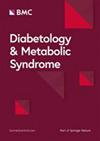治疗 MAFLD 的策略:电针通过增强 AMPK 介导的糖脂代谢和自噬,缓解 T2DM 大鼠的肝脂肪变性和肝纤维化
IF 3.4
3区 医学
Q2 ENDOCRINOLOGY & METABOLISM
引用次数: 0
摘要
最近的研究表明,2 型糖尿病(T2DM)是导致代谢功能障碍相关性脂肪肝(MAFLD)的重要危险因素。本研究旨在评估电针(EA)对 T2DM 大鼠肝脏形态和功能的影响,从而为电针阻滞 T2DM 大鼠脂肪肝进展的潜力提供实验依据。实验采用高脂饮食和单次腹腔注射链脲佐菌素诱导T2DM大鼠,然后将其随机分为五组:T2DM组、电针组、二甲双胍组、电针和二甲双胍联合组、电针和复方C联合组。经过 6 周的干预后,评估了各组对空腹血糖、血脂、肝功能、形态、脂滴浸润和纤维化的影响。研究人员采用了包括 Western 印迹、qPCR、免疫组织化学和免疫荧光在内的技术来检测与 AMPK 相关的糖脂代谢、胰岛素信号传导、自噬和纤维化通路中关键分子的表达。此外,透射电子显微镜有助于观察肝脏自噬、脂滴和纤维化。我们的研究表明,高血糖、高脂血症和红外促进脂质积累、病理和功能损伤,并导致肝脏脂肪变性和纤维化。同时,EA通过促进PPARα/CPT1A和AMPK/mTOR通路的表达,抑制SREBP1c、PGC-1α/PCK2和TGFβ1/Smad2/3信号通路的表达,增强AMPK的活化,进而改善糖脂代谢和自噬,最终发挥改善T2DM大鼠肝脂肪变性和肝纤维化的作用。EA 的上述作用与二甲双胍的作用一致。EA 和二甲双胍联合使用在增加肝脏 AMPK 表达、改善肝脏形态、脂滴浸润、纤维化和降低血清 ALT 水平方面具有显著优势。此外,AMPK抑制剂化合物C也部分破坏了EA对T2DM大鼠MAFLD进展的改善作用。EA 上调了肝脏 AMPK 的表达,抑制了葡萄糖生成和脂肪生成,同时提高了脂肪酸氧化和自噬水平。因此,它减轻了 T2DM 大鼠的血糖、血脂和胰岛素抵抗,从而阻碍了肝脏脂肪变性和纤维化的进展,延缓了 MAFLD 的发展。本文章由计算机程序翻译,如有差异,请以英文原文为准。
Strategy for treating MAFLD: Electroacupuncture alleviates hepatic steatosis and fibrosis by enhancing AMPK mediated glycolipid metabolism and autophagy in T2DM rats
Recent studies have highlighted type 2 diabetes (T2DM) as a significant risk factor for the development of metabolic dysfunction-associated fatty liver disease (MAFLD). This investigation aimed to assess electroacupuncture’s (EA) impact on liver morphology and function in T2DM rats, furnishing experimental substantiation for its potential to stall MAFLD progression in T2DM. T2DM rats were induced by a high-fat diet and a single intraperitoneal injection of streptozotocin, and then randomly assigned to five groups: the T2DM group, the electroacupuncture group, the metformin group, combination group of electroacupuncture and metformin, combination group of electroacupuncture and Compound C. The control group received a standard diet alongside intraperitoneal citric acid - sodium citrate solution injections. After a 6-week intervention, the effects of each group on fasting blood glucose, lipids, liver function, morphology, lipid droplet infiltration, and fibrosis were evaluated. Techniques including Western blotting, qPCR, immunohistochemistry, and immunofluorescence were employed to gauge the expression of key molecules in AMPK-associated glycolipid metabolism, insulin signaling, autophagy, and fibrosis pathways. Additionally, transmission electron microscopy facilitated the observation of liver autophagy, lipid droplets, and fibrosis. Our studies indicated that hyperglycemia, hyperlipidemia and IR promoted lipid accumulation, pathological and functional damage, and resulting in hepatic steatosis and fibrosis. Meanwhile, EA enhanced the activation of AMPK, which in turn improved glycolipid metabolism and autophagy through promoting the expression of PPARα/CPT1A and AMPK/mTOR pathway, inhibiting the expression of SREBP1c, PGC-1α/PCK2 and TGFβ1/Smad2/3 signaling pathway, ultimately exerting its effect on ameliorating hepatic steatosis and fibrosis in T2DM rats. The above effects of EA were consistent with metformin. The combination of EA and metformin had significant advantages in increasing hepatic AMPK expression, improving liver morphology, lipid droplet infiltration, fibrosis, and reducing serum ALT levels. In addition, the ameliorating effects of EA on the progression of MAFLD in T2DM rats were partly disrupted by Compound C, an inhibitor of AMPK. EA upregulated hepatic AMPK expression, curtailing gluconeogenesis and lipogenesis while boosting fatty acid oxidation and autophagy levels. Consequently, it mitigated blood glucose, lipids, and insulin resistance in T2DM rats, thus impeding liver steatosis and fibrosis progression and retarding MAFLD advancement.
求助全文
通过发布文献求助,成功后即可免费获取论文全文。
去求助
来源期刊

Diabetology & Metabolic Syndrome
ENDOCRINOLOGY & METABOLISM-
CiteScore
6.20
自引率
0.00%
发文量
170
审稿时长
7.5 months
期刊介绍:
Diabetology & Metabolic Syndrome publishes articles on all aspects of the pathophysiology of diabetes and metabolic syndrome.
By publishing original material exploring any area of laboratory, animal or clinical research into diabetes and metabolic syndrome, the journal offers a high-visibility forum for new insights and discussions into the issues of importance to the relevant community.
 求助内容:
求助内容: 应助结果提醒方式:
应助结果提醒方式:


